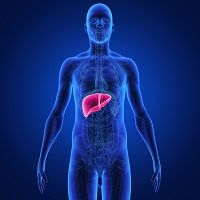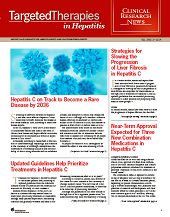Publication
Article
Targeted Therapies: Hepatitis C
Strategies for Slowing the Progression of Liver Fibrosis in Hepatitis C
Author(s):
In 2 recent studies, statins and aspirin have been associated with lower rates of progression of liver fibrosis in patients with hepatitis C.

In 2 recent studies, statins and aspirin have been associated with lower rates of progression of liver fibrosis in patients with hepatitis C. Strategies for slowing the rate of progression of liver fibrosis are important for these reasons: (1) the high cost of treatment for hepatitis C; and (2) updated guidelines that recommend prioritizing treatment to sicker patients and postponing treatment in other groups.1-4
Statins
In animal models, statins have been shown to slow the progression of hepatic fibrosis, but this finding has only recently been evaluated in humans. Using data from the HALT-C trial, researchers Simon et al examined the relationship between statin use and changes in liver fibrosis scores.3
Of 1050 patients with chronic hepatitis C infection enrolled in the HALT-C trial, patients had an initial Ishak fibrosis score of 3 or greater, indicating advanced hepatic fibrosis. Over 3.5 years, the HALT-C investigators measured fibrosis levels periodically in patients with chronic hepatitis C and advanced hepatic fibrosis. Progression, defined as a 2-point increase in the Ishak fibrosis score, was 78% less likely to occur in patients who were taking statins (95% confidence interval [CI], 1%-90%), and the association remained significant after adjusting for confounders.3
Moreover, in statin users, Ishak fibrosis scores fell by an average of 0.34 points over 3.5 years, but increased by an average of 0.42 points in patients who were not receiving statins. The difference, when adjusted for baseline fibrosis scores, was statistically significant (P = .006).3
The effect of statins in reducing the rate of liver fibrosis appears to be unique, because other lipid-lowering medications have not significantly reduced the likelihood of fibrosis progression (P = .21).3
Previous animal studies point to plausible mechanisms for the hepatoprotective effect of statins: reduced activation of hepatic myofibroblasts, inhibition of hepatic stellate cell proliferation, and inhibition of collagen production.3
Although larger studies will be required to determine the validity of the findings of this retrospective analysis, results of this study and previous animal studies indicate that statin use may help reduce the risk of liver damage progression in patients with hepatitis C.3
Aspirin
According to a study by Poujol-Robert et al published in Clinics and Research in Hepatology and Gastroenterology, daily aspirin at a low dose of 75 mg/ day to 100 mg/day may reduce the risk of fibrosis progression in patients with recurrent hepatitis C virus infection.4
All patients involved in the study had received a liver transplant between 2000 and 2010, and were assumed to have an initial METAVIR score of F0 immediately after having the transplant. Fibrosis measures were available in 188 patients.4
Aspirin intake was associated with a statistically significant 25% lower risk of progression at METAVIR fibrosis levels of 2 or greater than 6 months to 18 months after transplant (hazard ratio [HR], 0.75 [0.57-0.97]; P = .03). Upon multivariate adjustment, aspirin use remained significantly associated with a lower rate of fibrosis progression (HR, 0.65 [0.47-0.91]; P = .01).4
Investigators suggested that aspirin use may reduce levels of inflammatory mediators, including interleukin-6, monocyte chemoattractant protein-1, transforming growth factor-β, tumor necrosis
factor α, and platelet-derived growth factor. Other studies have shown benefits of antiplatelet agents in models of liver fibrosis, including cilostazol and dipyridamole. Despite the association identified in this study, future prospective studies will be needed to confirm the results of this study.4
Conclusion
Although there are no prospective studies demonstrating the efficacy of statins and aspirin in reducing the progression of fibrosis scores, retrospective analyses of large databases suggest a hepatoprotective effect of these 2 medications. In patients who are postponing treatment, slowing the progression of liver damage is an important priority, and the fact that 2 commonly used classes of medications may have this desirable effect may help patients awaiting treatment do more to preserve liver function.
References
1. McCarthy M. Treat sickest hepatitis C patients first, new US guidelines recommend. BMJ. 2014;349:g5163.
2. AASLD/IDSA. AASLD/IDSA Guidelines for Treatment of Hepatitis C. http://www.hcvguidelines.org/full-report/whenand-whom-initiate-hcv-therapy. Accessed August 2014.
3. Simon TG, King LY, Zheng H, Chung RT. Statin Use is associated with a reduced risk of fibrosis progression in chronic hepatitis C. J Hepatol. 2014;Aug 15. pii: S0168-8278(14)00552-2.
4. Poujol-Robert A, Boëlle PY, Conti F, et al. Aspirin may reduce liver fibrosis progression: evidence from a multicenter retrospective study of recurrent hepatitis C after liver transplantation. Clin Res Hepatol Gastroenterol. 2014;Aug 14. pii:S2210-7401(14)00166-1.






